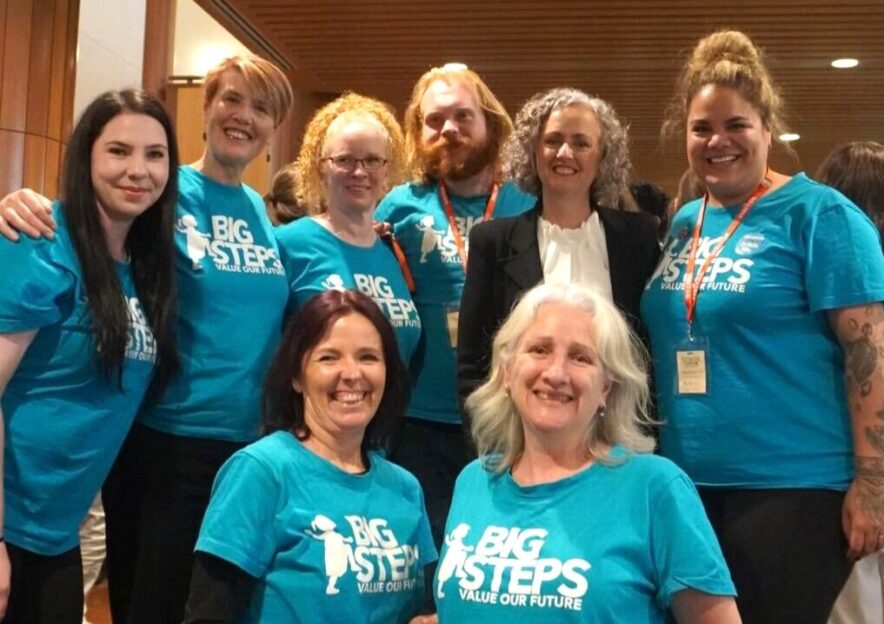“We are not babysitters”: Budget recognition for our early childhood educators

There aren’t many jobs more important than those of our early childhood educators. Dr Jess Walsh, Labor Senator for Victoria, highlights the significance of the Federal Government supporting a long overdue pay rise for the early childhood education and care (ECEC) workforce – more than 90 per cent of whom are women.
Gemma has worked in ECEC for close to two decades. A dedicated and passionate educator, her time in the sector began at just 16 years old sweeping the floors of her centre. Now, she is the Director in charge of the very same place.
Unfortunately low wages are forcing ECEC professionals like Gemma to abandon the jobs they love. With educators making just half the average national wage, love just doesn’t pay the bills.
As a Centre Director, Gemma has watched dozens of educators make the difficult decision to leave the sector in search of better pay. She even reveals that she’s thought of quitting the profession she’s dedicated her life to as well.
Thankfully, thanks to recent announcements in the Federal Budget, Gemma and thousands of professionals just like her will receive a crucial pay rise.
A workforce in crisis
Workforce shortages are rife across the ECEC sector, with over a third of educators leaving the profession each year.
This often means centres have to rely on casual agency staff, or close rooms to get by.
“At one point I had no team around me, and I was relying on agency workers,” Gemma says. “Staff were just rotating through the centre. Myself and my staff were burnt out.”
High turnover of educators is distressing to children torn away from the educators they have come to trust – and it’s simply not sustainable. It puts extraordinary pressure on those educators who remain, and it shouldn’t be this way.
Early childhood educators are the backbone of our society.
Quality education and care lays the foundation in the first five years for lifelong development and learning.
Parents know their children are developing the social, emotional and cognitive skills they’ll need for a healthy life while they’re at work.
And our whole economy depends on this essential army of overwhelmingly female workers.
Valuing our educators
It’s no coincidence that early educators are underpaid, and that they are more than 90 percent women.
For years, these women have fought to shatter the idea that they are “just looking after children” while their parents are at work.
“We are educators, not babysitters” Gemma said.
“The work we do is complex and valuable, but up until now, it hasn’t been valued.”
The sector has professionalised with educators required to have a Diploma, Certificate III or to be studying for one.
Educators wear multiple hats in one day: providing a play-based learning program to each child, performing observations, supporting families with complex needs, and so much more.
It’s a huge responsibility. It’s highly skilled. And $26 an hour just doesn’t cut it.
Time for recognition
When Treasurer Jim Chalmers rose to deliver his Budget speech, educators watched on nervously from the gallery.
When he announced the government would support a pay rise for early childhood educators, a huge cheer erupted.Gemma was there for this historic moment.
“For the Treasurer to announce that they have a provision for a wage increase for educators is huge! It’s amazing” she said.
“This recognition will mean educators will come back to the workforce. They will feel seen and respected.” says Gemma.
On top of her work as an educator and Director, Gemma has been at the bargaining table, fighting for better pay for this vital sector to get the recognition they deserve.
Educators are using new and historic multi-employer bargaining laws to sit down with their employers, and bargain the wage increase, along with improved professional development opportunities too.
Gemma explains that in addition to a pay rise, educators want training to better tailor programs to each child, particularly after COVID-19 impacted so many families and created complex needs.
A brighter future
Women like Gemma aren’t just speaking out for educators today; they are fighting for the future workforce for generations to come.
“We have so many advocates like myself that have been waiting for this announcement to be made to the nation. We will continue to work hard to deliver this, and we’ll stand a bit taller too,” she said.
“Families already know the importance of the work ECEC professionals do, and now the Government is recognising it as well.”
“We know quality early education and care leads to better health, education, and employment outcomes later in life,” Dr Walsh added.
“Our educators, our children, our families, and our community deserve this change, and we’re getting on with it, because we need more amazing people like Gemma, working with the next generation of Australians, and because ensuring women’s economic security is critical to the future of this country too.”
To learn more about the Budget announcement in the context of ECEC please see here.
Popular

Quality
Practice
Provider
Research
Workforce
Honouring the quiet magic of early childhood
2025-07-11 09:15:00
by Fiona Alston

Practice
Provider
Quality
Research
Workforce
New activity booklet supports everyday conversations to keep children safe
2025-07-10 09:00:16
by Fiona Alston

Quality
Practice
Provider
Workforce
Reclaiming Joy: Why connection, curiosity and care still matter in early childhood education
2025-07-09 10:00:07
by Fiona Alston













